|
Last night, I posted a review of my first ever review copy of a game. Quest: Awakening of Melior was successfully backed on Kickstarter a while back, but went to backers around August. Check out my review below! (And feel free to skip to my final thoughts by clicking the link in the video description.)
0 Comments
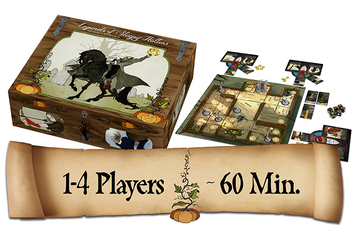 Although I don't have the money to back anything new right now, I am definitely keeping an eye on Kickstarter. So many good solo games pop up there! Here are a few of the possible gems that came to my attention this week: 1. Legends of Sleepy Hollow This project from Dice Hate Me Games is definitely aesthetically pleasing, and the gameplay looks interesting as well. It's a cooperative game that involves fear as a mechanic that actually affects your characters' abilities, which is something I love. (I know that Level 7: Escape is a bit of a cracked gem, but I love the fear mechanic in that game as well.) I also like that this is a campaign game with replayable scenarios and possibilities for expansion. 2. Perdition's Mouth - Revised Edition A version of this game was previously funded on Kickstarter, and Perdition's Mouth promises something very interesting: an intense dungeon crawling experience, but with minimal time to set up and learn the game. The game also promises short playtimes. Given that this game compares itself to other games like Gloomhaven, which can have a very long runtime, I am intrigued. 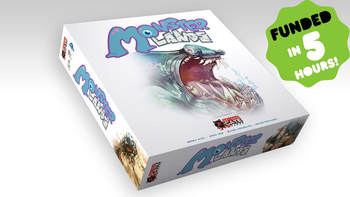 3. Monster Lands This strategic dice placement game looks like a pretty good time. You build up your power and resources, then fight epic battles against monsters. The art looks good, the game comes with cool custom dice, and I am particularly intrigued by the fact that you can choose how you want to approach your monster battles. (Do you want to build traps? Brew potions? Both of these are options!) I also like that the game's style is more cute than scary. A lot of what I've been playing recently takes such a serious tone. This one might be a good aesthetic breather. 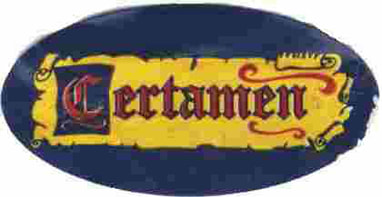 FYI: This post isn't about board games, per se. But it's about competitive play, and my experiences in this part of my life definitely impact my relationship with board games as a hobby. I had a really busy Saturday at Fall Forum, an event for the Georgia Junior Classical League. It was awesome. Over 700 nerdy Latin students converged to take competitive academic tests, show off their art projects, do cool workshops (one of my students was particularly enamored with PVC pipe gladiator weapons!), and play Certamen. Certamen is basically Latin quiz bowl. Its name means "contest" or "battle" in Latin. Students play in teams and try to be the first to buzz in on questions about history, mythology, and the Latin language. The game is fast-paced, and it's exhilarating when you win. I would know—I was a hardcore Certamen player when I was in high school. I didn't start Latin until I was a junior, but I was a national champion in my novice year and got bumped to an advanced team for my second year. There was a time in my life when I lived, breathed, and dreamed Certamen... and I'm not 100% sure it was good for me. The year I was on the national team, three of the other four students I played with were from one high school—the same one as our coach. Only four students can actually play on a Certamen team, and I won the mythology specialist spot. The coach already had a student who was "supposed" to be her myth person. As was her right, that other kid challenged me for the spot repeatedly, and lost each time. But it didn't end there. At State, when we won (largely thanks to my efforts, I might add), the coach was overheard telling her favored student not to worry, because soon it would be her in that seat, and not me. I still got to enjoy the thrill of competition when we played other teams, but practices were... uncomfortable. The next year, I skipped the intermediate level to avoid playing with those same kids, and went straight to advanced. This was mostly good, except that I needed more team support to win (I had been able to basically do it alone as a novice) and we never quite got it together. The sting of defeat was terrible for me, because that was not how I had come to view myself as a Certamen player. I remember being so upset at the time... Looking back on it, it's so silly. But when you're a teenager, that stuff can be your whole way of showing the world who you are and what you're good for. I haven't thought much about these experiences in years, but it all came rushing back yesterday, because I took my very first Certamen team to compete. We had practiced a bit beforehand, but I try to keep things light in my Latin club. I prioritize fun and enjoyment over intensity. I had no idea how they would do, and I hadn't really let myself give it much thought. Then, while I was judging the sight reading competition, my phone EXPLODED with text messages: "DR. D WE ARE IN THE CERTAMEN FINALS!!!!" "WE DID IT WE ARE GOING TO THE FINAL ROUND!" My first response was to tear up a little bit. I have the best students in the world and I could not be prouder of them. And you know I begged my way out of judging duty to get to that round so I could watch. Seeing my kids play was awesome. They were supportive of each other as a team, and they answered some tough questions that most adults wouldn't even know the answers to. I have never felt so nervous for anyone, or so proud. Although they didn't win, my kids did come in second, and only to a school with a powerhouse Certamen program. Those other students are very highly trained when it comes to knowing when to buzz, what types of questions might be asked, etc. etc. I could tell from the way the kids carried themselves that being dominant in Certamen is a huge part of their identity... just like it was part of mine at their age. After the round, I told my students how happy I was with how they played. But then I saw that familiar fire in their eyes—they want to play harder. They want to play to win. Games are only fun while they remain games. When they become about real-life disputes, or proof of superiority, or a way to prove a point, then the fun dies out. Right now, my students are having fun. If the intensity of competition is fun for them, then I'm all for it. If it helps them have closer friendships with each other and they make great high school memories together, then I'm all for it. But I never want competition to poison things for them the way it did for me. I never want to see that light in their eyes go out. 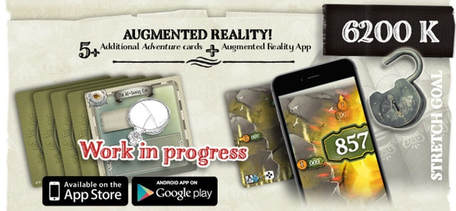 The Kickstarter campaign for The 7th Continent is coming to a dramatic close, and its second-to-last stretch goal has been revealed: An app-in-development that will allow some augmented reality exploration of the Continent. The response has been mixed. Some gamers feel that the game is tarnished now, partially through the integration of an app when games should be analog, and partially because the addition of an app will make a portion of the game unplayable if and when that app is no longer supported. I'm going to come out and say, however, that I think the addition of a few augmented reality cards is cool—we're talking a small add-on to the game (only 5 additional cards) that you won't even use unless you organically discover the "all-seeing eye" item organically while playing the game. The item will also have special rules that make it usable even without an app. That makes the entire tech integration part of this optional, so that the analog-committed can continue to enjoy their games in their preferred way. To me, the fact that you won't even know how to download the app without the right card adds to the adventure and will keep me playing the game longer in search of interesting surprises. I missed the first Kickstarter, but I backed this round of The 7th Continent because I was promised that I would do things I have never seen or done in a game before. As far as I'm concerned, this app represents Serious Poulp continuing to deliver on that promise. I am always curious to see discussions of how tech is integrated into board gaming, because I think our arguments about it are actually arguments about who we are as board gamers. Are we open to technology? Are we totally committed to analog play? And what do our answers to those questions say about us? As someone who also loves video games and who plays a lot of app versions of board games, I think I am already primed for more gaming apps. I am open to what The 7th Continent is trying to do. That said, I will not be happy if down the line I need a separate app for every board game I want to play. Technology that does something cool in the service of a game, that makes sense within the game world, is something I can go for. But I also don't want to download a bunch of extraneous junk and clog up my phone. We'll see how board games continue to develop in the coming years! 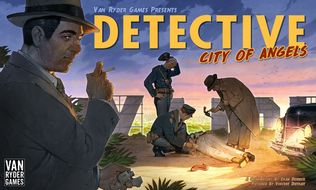 Is it just me, or does it seem like great Kickstarters come in bunches? On top of the campaigns with great solo options I mentioned last week, there are two more currently in action. 1. Detective: City of Angels I'm kind of imagining this as L. A. Noire, the board game. When playing with others, you can play the game cooperatively or competitively. The game also includes a player called the "Chisel" whose job is to provide you with information—sometimes false information—in the most frustrating way possible, just as if you were interrogating real suspects. In solo mode, you interview suspects by working with a case book, much like in Sherlock Holmes: Consulting Detective. I love mystery-solving games, and this one seems like it's all about mimicking the feeling of solving an actual mystery. Plus, I can't think of too many good noir-themed board games, so this will spice up my steady diet of fantasy and farming/trade games... I also trust Van Ryder Games to deliver a great product. Hostage Negotiator has certainly never let me down. 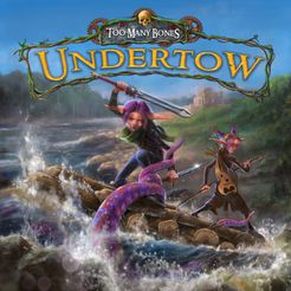 2. Too Many Bones: Undertow This one is an insta-back for me. I love Too Many Bones and I love Chip Theory Games in general. Their high-quality components and attention to solo play make up for the fact that their games are pretty expensive. I'm excited about having a new set of adventures and enemies, plus two new Gearlocs to play with. But I'm also delighted that the Undertow campaign may include cool stuff for the original game, including a possible campaign mode. If you'd like to try a big, fun, dice-building RPG, then Too Many Bones might be for you. Given that the base game is currently sold out, this Kickstarter campaign is also a chance to pick up the original. Kickstarter is a dangerous place for a board gamer, with so much interesting stuff going on. After this month, I might need to avoid Kickstarter for a long while. But I also look forward to receiving lots of interesting packages in the mail over the next year or so... Check out my Let's Play of Castle Ravenloft, in which I try to escape from an evil vampire! Will I make it out alive? It's divided into three parts:  If you've been watching the news (Harvey Weinstein, gross) or reading about women in tabletop on Twitter (#womenintabletop, yay!), you are probably aware that our society is not as inclusive as it ought to be. This is even more true when it comes to people of color and members of the LGBTQ community. But making your game night more inclusive does not have to involve an incredibly complicated process of self-reflection and social overhaul. At least not right away. You can start very simply by trying a few of the following things: 1. Don't make assumptions about people's gaming backgrounds. That guy with the geek-chic glasses may never have even played Catan before, while his girlfriend is an avid war gamer. Until you actually talk to someone, you just don't know what their interests and relative gaming strengths are. I can't tell you how many times people at gaming meetups have looked at my boyfriend like he was the hardcore board gamer, or how many GameStop employees have assumed that a PS4 game is for him. Why create an uncomfortable situation by making assumptions? Just wait and let people tell you about themselves in their own good time. 2. If you are playing with someone who is unfamiliar with games, be kind. Nobody popped out of the womb knowing how to game. And some things come easier to people than others. When you have a new gamer in your group, try to remember that there was also a time when you didn't know how to discuss the fine distinctions between worker placement and action selection. There was a time (and there probably still are times) when a quick verbal explanation of a game taught you nothing about how to play it, and it took you a few turns to get into the rhythm of things. Don't lose patience with people who are learning, even (especially) if they don't learn as fast as you think they should. As a teacher, let me tell you: You might think that something is easy/obvious, or that your explanation was crystal clear, but prepare to be shocked by how wrong you are. 3. Don't dismiss people's concerns without actually listening. If something was bothering you and you brought it up in a mature, reasonable way, wouldn't you be pissed if the other person just waved a hand and dismissed you? That is how women feel all the time when they say that something is making them uncomfortable. No conversation, group tradition, or joke is so important that it needs to be defended to the death against a reasonably stated concern. Try actually listening to people and at least wondering for a moment if they might be onto something. 4. Joke, but don't tell "jokes." I am a smartass. I routinely tell my students that they are failing my class, or that they don't get a bathroom break, or that their next test is two hours long. Why is it funny? Because I have an actual relationship with my students. Also, those jokes are "mean," but they are also totally outlandish. Sarcastic jokes stop being funny when they hit too close to home. You don't have to totally change your personality to please other people. Go ahead and be a little bit edgy and sarcastic. But "edgy" and "sarcastic" are not the words I'd use to describe gross jokes about women's bodies or racist remarks. If you're the sort of person who makes those "jokes," you probably already know that. 5. Be respectful of other people's tastes in games. We all like to bag on Monopoly, and I'm not saying we have to like it. But if I went to a board game group and said that I used to love playing Monopoly as a kid, I would immediately want to run screaming into the night if the people I had told dismissed me so coldly. If I had worked up the courage to go to a game meetup and try to make new friends, I would be crushed. Even among more experienced gamers, I see a distinct hierarchy that places heavier games at the top and party games at the bottom. If you're having fun, a game is a game is a game. These suggestions will work in any situation, with any new gamer. And they are not just about "pandering" to certain demographics. These are basic rules of engagement that will make your game nights more fun, no matter who is at the table with you. 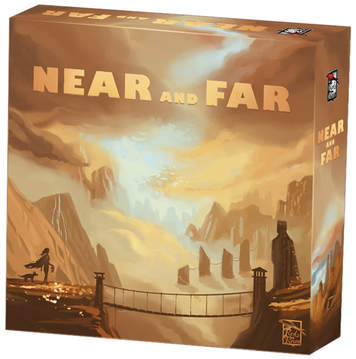 Given that an expansion for Near and Far from Red Raven Games has just hit Kickstarter, I was curious about the base game. I got lucky at a Meetup last night and had a chance to try it out. I will start by saying there is plenty to enjoy about Near and Far. The game is easy to pick up. It's engaging. The art is beautiful, and there are lots of ways to make progress so you don't feel stuck. I can absolutely see this game being right for certain players. But for me, it wasn't the right fit, and I am glad I figured it out in time. My issue is not that I didn't have fun. If asked, I would certainly play Near and Far again and do it with a smile. My issue is with the integration of story elements (or lack thereof) into the rest of the game. Near and Far primes you to think of it as a grand story to co-create with your friends. The game maps are printed in a book. The game also comes with a storybook that you read at certain points à la Tales of the Arabian Nights. But there are only certain spaces on the map that come with story sequences, and if you focus too much on them you might miss the real point of the game: amassing victory points. The stories also have no long-term consequences for the rest of your game (at least in the one-off game I played). Even if your reputation drops or something, you can just go to town and pay money to improve it again. In fact, if you want to win Near and Far, you can mostly proceed without paying attention to the story aspects of it at all, except to try to earn banner tokens. I love story-driven games, and when we started playing, I was sure that Near and Far would be right up my alley. But the fact is that the game's story elements are sporadic, not connected with each other, and not particularly essential to victory. I like the story of a game and its victory conditions to intertwine. Near and Far doesn't quite succeed in that respect, at least not for me. I am excited to announce that I have uploaded another Let's Play to YouTube. I had a lot of fun making this one, and I'm looking forward to whatever comes next. I had been both curious and anxious about making videos for years, and now that I'm doing it I don't know why I waited so long. This is fun! In this video, I play Triplock, a steampunk lock-picking game from Chip Theory Games. Their solo mode has it's own storyline, but I took some liberties.... 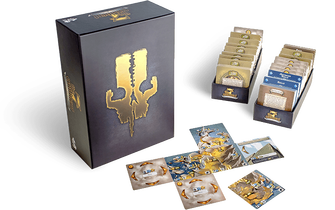 As usual, Kickstarter has several interesting board game projects in progress, with more to come! Also as usual, several of them are solo friendly. Also, expensive AF. Here are the projects I've been watching this week: 1. The 7th Continent This game is getting huge buzz, and for good reason. It's an ambitious exploration game that makes use of 1000+ cards. It offers visual puzzles and crafting/hunting requirements that most board games do not. My attraction to it is that I love games that generate stories, and The 7th Continent seems ripe with possibility. It's also, however, a huge punch to the wallet—a reality that you'll have to face very soon if you want a copy. This Kickstarter campaign is billed as your "last chance" to get the game, which will not be going to retail. Normally I am immediately turned off by projects that have a "now or never" marketing campaign, but the reviews I have heard and read are very compelling. This is also a game that seems ideal for 1–2 players, which makes it perfect for my own at-home gaming needs. We'll see what happens with this one. 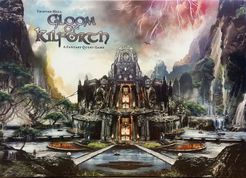 2. Gloom of Kilforth This is another expensive project, but I'm absurdly excited about Gloom of Kilforth. Card-driven fantasy quest games with die rolls are right up my alley, Especially when the art is ridiculously beautiful—I can't wait to get my hands on this one just to spend time looking at all of the cards! Gloom of Kilforth is also a game rich in story, in which your character gains skill and experience in ways that look oh-so satisfying. And as unscientific is this is, I have a feeling about Gloom of Kilforth. I didn't back it the first time around, but I'm sold on it this time, and my instincts are telling me I am going to love it. 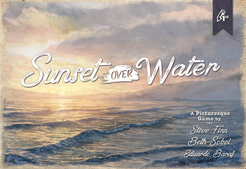 3. Forest of Fate: A Storytelling Survival Adventure This project is much smaller and less buzz-heavy, but I am very interested in what I'm seeing. I love games that let you experience new stories, either alone or with your friends, and Forest of Fate is compelling on that front. This game reminds me of Tales of the Arabian Nights, but with a twist. You get a storybook that tells you what happens next, but you have slightly more control over events in your story—you choose which characters undertake a challenge, and challenge requirements vary depending on the direction from which you approach each obstacle in your path. I'm very curious to play this one, both solo (running two characters) and with friends and students. Even if it doesn't turn out to be great, I think Forest of Fate has a lot of potential. 4. Sunset Over Water As much as I love heavy fantasy board games, I need a palate cleanser from time to time. I think that Sunset Over Water will meet that need for me. In this game, you are a painter looking for stunningly beautiful landscapes to paint. I love that theme, and given that this is the same team that did Herbaceous, I completely trust that the cards will be beautiful. Sunset Over Water is also being advertised as an accessible, easy-to-learn "coffee house" game. I need a few more of those in my life, especially since this game might be the type I can lure my boyfriend into playing with me. Also, at $19 ($39 if you want both this game and its predecessor, Herbaceous), the price is right. There is about a week left on this one, so have a look ASAP if this sounds like your sort of thing. |
AuthorMy name is Liz Davidson, and I play solo board games. A lot of solo board games... Archives
August 2021
Categories
All
|
 RSS Feed
RSS Feed